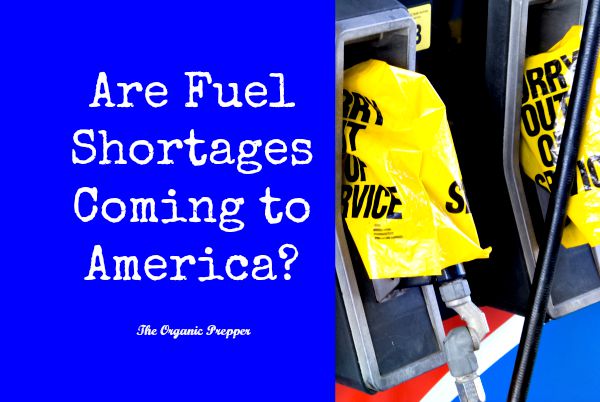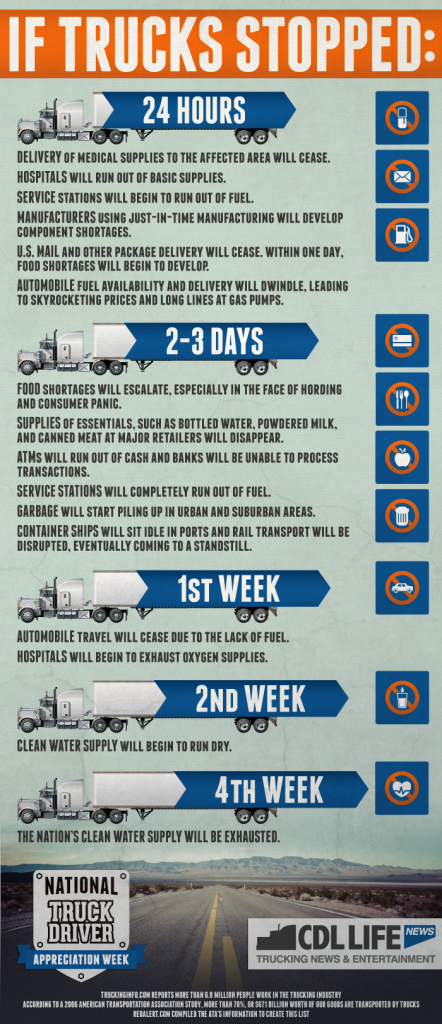If you're new here, you may want to subscribe to my RSS feed. Thanks for visiting!
By Daisy Luther
Gas shortages could be coming to America…and quickly.
An unexpected fuel crisis has hit Canada. According to a Canadian blogger and author, not one, but two, fuel tankers were inexplicably delayed last week, and shortages ensued alarmingly quickly, with numerous gas stations running completely out of fuel within a matter of days. Marie Beausoleil wrote:
The delay was long enough that gas stations across Nova Scotia ran out of gas, even with a week of rationing. The gas stations knew the tankers were going to be late and starting rationing in advance.
By Thursday, storage tanks in the city of Dartmouth were empty.
The tankers arrived on Friday and started the process of unloading.
By Saturday the shortage had spread to the smaller communities, the less busy gas stations.
By Sunday evening, motorists across the province were stranded and “Out of gas” signs were everywhere. It would take, people were warned, at least a week to get all service stations filled across the province (and if you’re not familiar with it, Nova Scotia is a very small place!) (Check out the rest of the article HERE)
If you couple a potential fuel shortage with the dramatic instability of the US stock market, it sure doesn’t paint a sunny forecast for the American economy.
A major fuel shortage could send epic economic shockwaves across the country, since our economy is based on cheap oil.
It all boils down to this: the transportation system.
- If we can’t transport goods, businesses will have nothing to sell.
- If businesses have nothing to sell, they can’t keep their staff employed.
- If people have no work, they have no money.
- If a few items are available, they will be outrageously expensive and not many folks will be able to afford the goods.
- If you DO have money, you still have very little to buy.
Lots of people like to shake their heads and say, “Oh, this won’t hurt me at all.” That’s pretty shortsighted, because a fuel shortage will affect EVERYONE. CDL Life News recently published this alarming infographic.
Many people are watching the “news” and feeling much better about our economic situation as the talking heads espouse platitudes, but it’s important to note that the government doesn’t want a panic. A central banking economist has flat out recommended that the general public be lied to about the depth of the global economic crisis, saying that “banking supervisors should withhold some information when they publish stress test results to prevent both bank runs and excessive risk taking by lenders.”
Unless you are collecting your own information and watching the markets, the price and availability of oil, and the fate of the American dollar, you run an extremely high risk of being deceived with warm and encouraging platitudes.
Prepping for fuel shortages
If you wait until there are long lines and empty pumps, you’ve waited too long to prep for fuel shortages. Learn everything you need to know about general preparedness in this compendium that must be on every serious prepper’s bookshelf. Take the following 7 steps to preempt the crisis before it occurs.
- Stock up on food and supplies. If you haven’t begun to create a stockpile of food and supplies, you need to get on the ball. Check out this article for how to build a 30-day emergency food supply quickly, and this book to learn how to build your stockpile on a tight budget.
- Stock up on water and figure out a secondary source. As you can see in the infographic above, a breakdown of the transportation system will begin to strongly affect the municipal water supply within two weeks. Learn about water in this series and keep all of the information you need about water acquisition, storage, and purification close at hand with this book. It’s not just enough to stockpile water, though. You need to find a secondary supply, whether it’s a nearby body of water, a well, or a spring.
- Get your personal finances in order. You don’t want to be in debt if economic disaster strikes. If you’ve paid off the majority of your debt, invest your money into tangible goods like food, supplies, seeds, and precious metals. Check out this financial guide for preppers.
- Switch to local products. Stop focusing on products that have their origins in China or the tropics. Learn to live on things produced in your area. Start getting to know your neighbors, local artisans, and farmers, so that you can begin to build a community network. For centuries, our needs were mostly met within 50 miles from our homes. It’s time to get back to local economies.
- Learn to produce what you need to survive. While no person is an island, there’s a lot you can do to become more self-reliant. Homesteading, gardening, raising small livestock, preserving food, sewing, mending, healing, hunting, and building are all skills that have nearly been lost. Revive them and you’ll do far better in the event of an economic collapse.
- Store fuel. If you live somewhere that you can safely store fuel, you should buy as much as you can safely store. It will be worth its weight in gold should a fuel shortage occur. (Follow these guidelines for storing it safely.) Always keep your vehicles reservoirs filled above half a tank so that you can delay the long lines at the pumps for as long as possible.
- Be prepared to defend your family and property. When sources of supplies become scarce, you can bet on the fact that those who didn’t prepare will be coming after the supplies of those who did. First, be very careful about letting others know that you’ve prepared. (OPSEC!!!! (OPerational SECurity). Loose lips sink ships, and people won’t come looking for things if they don’t know you have them. Second, if the economic SHTF does occur, be ready to protect your family and your supplies.This means that to be prepared, you absolutely must be armed. This article can help and this book goes more in depth on the subject.
Our entire economy is based on fuel.
If the transportation system grinds to a halt, so too will our economy. The trucks, boats, and planes that carry our goods won’t be going anywhere without fuel to get the items to the consumers.
Gas shortages are a very big deal. Are you prepared for a local economy? What steps do you recommend to help others get ready?

















2 Responses
A very good reason, to ride a Harley.
Or a horse!